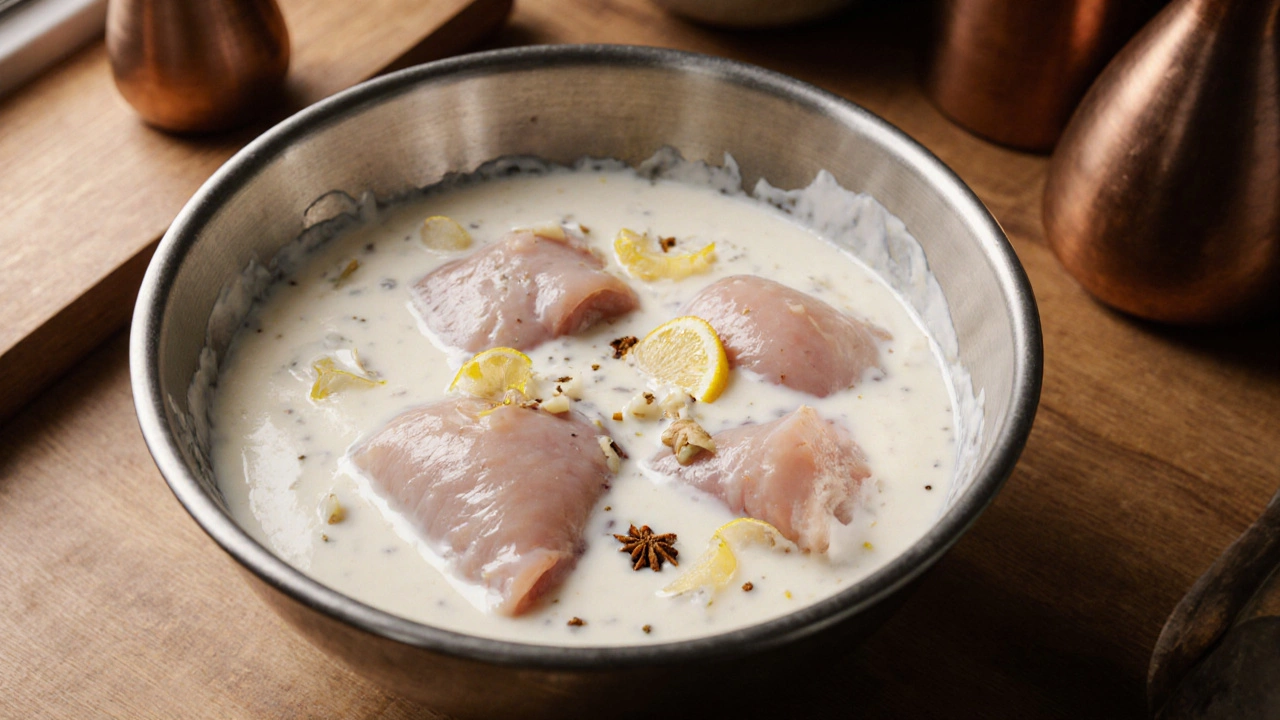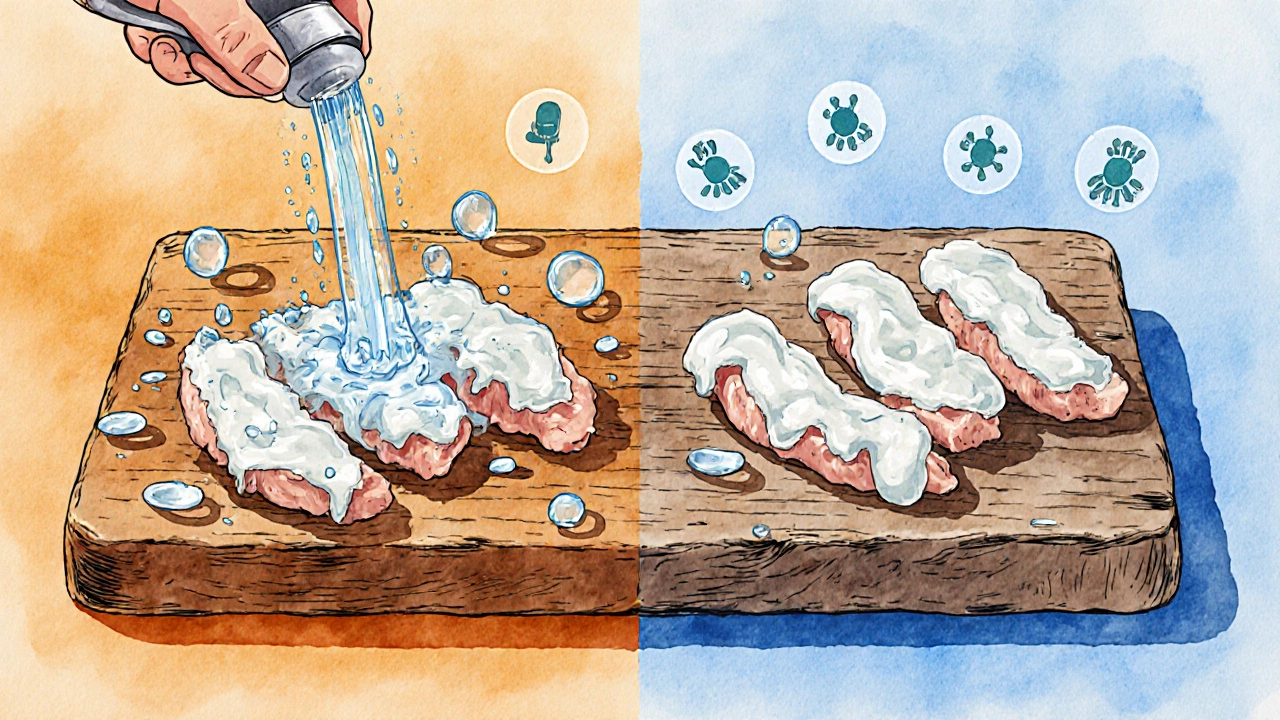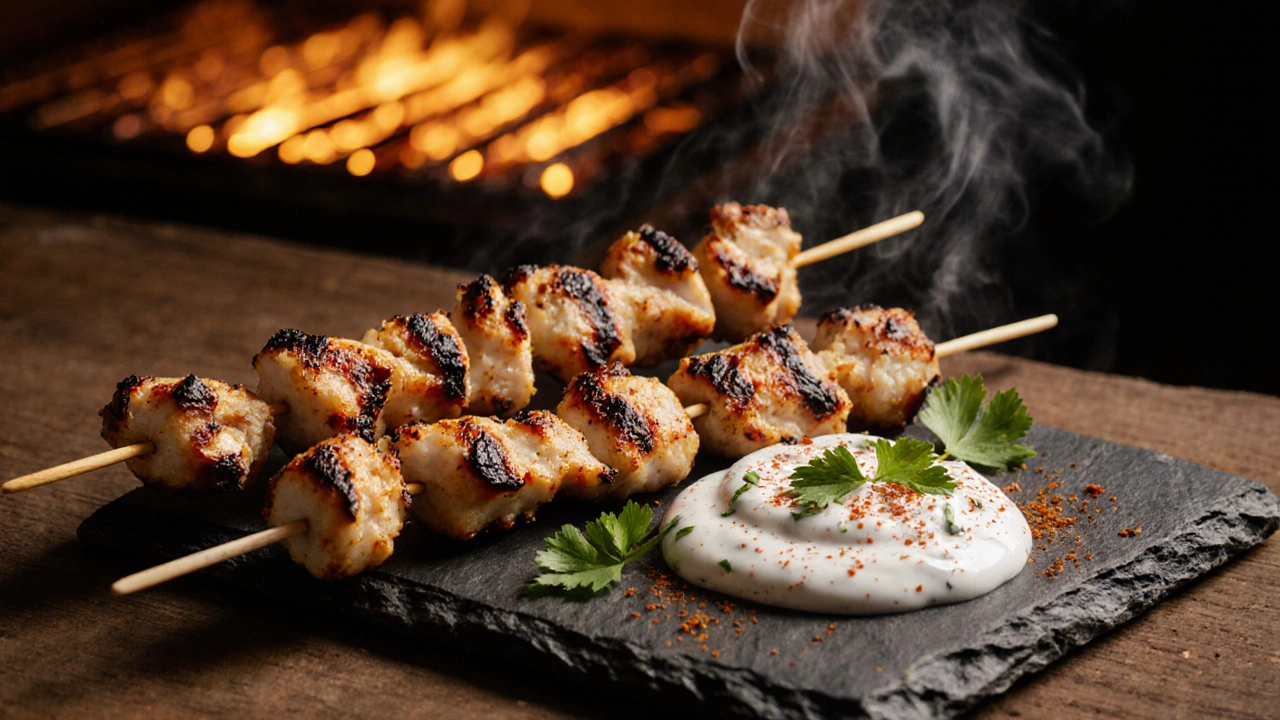Should You Rinse Yogurt Marinade Before Cooking?
 Oct, 10 2025
Oct, 10 2025
Yogurt Marinade Decision Helper
Your decision will appear here after you click "Make Decision"
Decision Logic
Based on your inputs, this tool determines whether rinsing your yogurt marinade is recommended. Factors considered include marination duration, temperature, meat type, and desired outcome.
When a recipe calls for a yogurt marinade, many home cooks wonder whether they should give it a quick rinse before popping it on the grill or into the oven. The answer isn’t a simple “yes” or “no” - it depends on the flavor you want, the texture you’re after, and food‑safety considerations. Below we break down the science, the pros and cons, and give you a clear set‑by‑step rule‑book so you never have to guess again.
Key Takeaways
- Rinsing a yogurt‑based marinade removes most of the acid and enzymes that tenderize meat.
- Not rinsing preserves flavor, moisture, and the tenderizing effect.
- If the raw meat was soaked for more than 4hours at room temperature, a brief rinse can reduce bacterial load.
- Use a separate bowl for the excess sauce if you want a thick coating without rinsing the meat.
- Follow safe handling: keep the marinade refrigerated, discard it after use, and never reuse it without cooking.
What Exactly Is a Yogurt Marinade?
Yogurt Marinade is a mixture of plain yogurt, acidic ingredients (like lemon juice or vinegar), spices, and sometimes oil, used to coat proteins before cooking. The dairy base provides a creamy texture, while the lactic acid gently breaks down muscle fibers.
Because yogurt contains live cultures, it also adds a subtle tang that deepens the overall flavor profile. In Indian cuisine, it’s the secret behind dishes like chicken tikka and paneer bhurji; in the Mediterranean, it’s the base for kebabs and grilled fish.
Why the Rinse Question Pops Up
Many recipes that involve a long marination period (often 12hours or more) instruct you to discard the excess liquid before cooking. The reasoning varies:
- Safety fears: Some assume the raw meat has released harmful bacteria into the yogurt, making the sauce unsafe.
- Texture worries: Too much liquid can cause steaming rather than searing, leading to a soggy crust.
- Flavor dilution: Rinsing washes away the seasoned coating that the yogurt worked hard to build.
The key is to understand what the yogurt actually does during marination.

The Science Behind Yogurt in Marinades
Yogurt is a fermented dairy product containing live bacterial cultures (Lactobacillus spp.) and lactic acid. The acid gently denatures proteins, a process called protein denaturation, which makes meat more tender.
At the same time, the enzymes in yogurt help break down connective tissue, boosting moisture retention during cooking. This is why even a short 30‑minute soak can make a difference for tougher cuts like chicken thighs.
From a safety standpoint, the low pH (around 4.5) inhibits many pathogens, but it does not sterilize the meat. If the marinating time exceeds 4hours at room temperature, bacterial growth can occur, especially in warm climates like Mumbai.
Rinsing vs. Not Rinsing: Pros and Cons
| Aspect | Rinse Off | Leave On |
|---|---|---|
| Flavor Retention | Reduced because seasoning washes away | Maximum flavor infusion |
| Texture | Potentially drier crust, less tender | Moist, tender interior with a creamy crust |
| Safety (bacterial load) | Marginally lower surface bacteria if marinated >4h at room temp | Safe when marinated under refrigeration (<5°C) and discarded after use |
| Moisture Management | Less excess liquid, easier searing | May need to pat dry lightly or use a wire rack to avoid steaming |
| Cooking Time | Slightly shorter due to drier surface | Similar, but watch for excess moisture that can slow browning |
Notice that the biggest trade‑off is flavor versus a tiny safety edge. In most home kitchens, keeping the meat refrigerated during marination eliminates the need for a rinse.
Practical Guidelines: When to Rinse and When Not To
- Marinate in the fridge (≤5°C) for up to 24hours: No rinse needed. The yogurt’s acid and enzymes will stay on the surface, giving you the best taste.
- Marinate at room temperature for more than 2hours: Sprinkle a pinch of salt on the surface, then give a quick rinse under cold water. Pat dry before cooking.
- Using the leftover sauce as a dip: Do not reuse it. Yogurt that touched raw meat can harbor pathogens.
- Grilling or high‑heat searing: If you see a lot of liquid pooling, spread the meat on a rack for a few minutes to let excess drip off, or lightly blot with paper towels - no full rinse.
- Cooking delicate proteins (like fish): Rinse only if the yogurt layer is thick enough to suffocate the flesh, otherwise keep it on for moisture.

Common Mistakes and How to Fix Them
Mistake 1: Over‑marinating in the fridge - The meat can become mushy as the yogurt’s enzymes break down too much protein. Limit yogurt marinades to 12hours for chicken and 6hours for fish.
Fix: Set a timer. If you need longer flavor, add dry spices (cumin, paprika) after the first 12hours.
Mistake 2: Rinsing and then discarding the tasty sauce - You lose the very thing that made the dish special.
Fix: Reserve a small bowl of the excess yogurt mixture before rinsing. Use it as a finishing sauce after the meat is cooked - just make sure the meat is fully cooked first.
Mistake 3: Cooking the meat directly from the fridge - A cold surface causes uneven searing.
Fix: Take the marinated meat out 15minutes before cooking, let it come to room temperature, then pat lightly if needed.
Step‑by‑Step: The Safe & Tasty Yogurt Marinade Workflow
- Combine yogurt, lemon juice, minced garlic, ginger, and your favorite spices in a non‑reactive bowl.
- Whisk until smooth; the mixture should coat the back of a spoon.
- Add the meat (chicken, lamb, paneer) and ensure every piece is fully covered.
- Cover the bowl, label with date and time, and place it in the refrigerator (<5°C).
- After 12hours, remove the bowl, gently lift the meat, and let excess drip back into the bowl.
- If you notice a lot of liquid, transfer the meat to a clean plate, do not rinse, and pat the surface lightly with paper towels.
- Preheat your grill or pan to high heat (≈230°C). Cook the meat, turning once, until internal temperature reaches safe levels (75°C for chicken).
- While the meat rests, heat the leftover yogurt sauce (if kept separate) to a boil for 2minutes to kill any pathogens, then drizzle over the sliced meat.
Following this workflow gives you tender, flavorful results without the unnecessary step of rinsing.
Frequently Asked Questions
Do I have to discard the yogurt after marinating?
Yes, if the yogurt has touched raw meat it should be discarded or boiled before reuse. The safest route is to treat it like any other raw‑meat liquid.
Can I marinate with flavored Greek yogurt?
Absolutely. Flavored yogurts add extra herbs or fruit notes, but check the sugar content - too much sugar can cause caramelization and burning on high heat.
Is rinsing required for safety when I’m short on fridge space?
If you must marinate at room temperature, limit the time to under 2hours and give the meat a quick cold‑water rinse before cooking. Better yet, use a cooler with ice packs to keep it chilled.
Will rinsing reduce the tangy flavor of the dish?
Yes. The acid and spices embedded in the yogurt are washed away, so the final dish will taste milder and less complex.
Can I use a non‑dairy yogurt (like coconut or almond) for marinating?
Non‑dairy yogurts work, but they lack the same protein‑denaturing properties as dairy yogurt. Pair them with a splash of citrus or vinegar to achieve similar tenderness.
Bottom line: Rinsing a yogurt‑based marinade is rarely needed if you keep the meat cold. Skip the rinse, enjoy the full flavor, and follow safe handling rules, and you’ll end up with juicy, tender results every time.